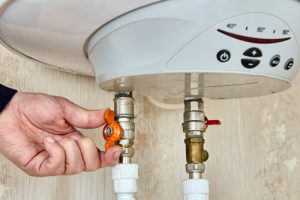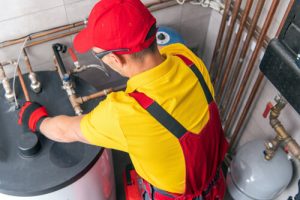When Should I Replace My Water Heater?
Water heaters are essential for our homes, providing hot water for showers, dishes, and more. But, like all appliances, they have a lifespan. The question “When should I replace my water heater?” is something many homeowners ponder. This guide by Central Plumbing in Baton Rouge aims to answer that very question.
At Central Plumbing, we know that understanding when to replace essential appliances like your water heater can be confusing. “When should I replace my water heater?” is a question we hear often. We’re here to help you navigate through this question and many others that arise about any plumbing issues. Call us at 225-925-8552 for unparalleled customer service and plumbing services.
 Understanding Your Water Heater
Understanding Your Water Heater
Every home relies on a water heater, but not every homeowner is familiar with the intricacies of this essential appliance. If you’re asking, “When should I replace my water heater?” the first thing to understand is what type of water heater you own. There are several types, ranging from traditional tank models to tankless on-demand systems, each with benefits and a typical lifespan.
Traditional tank water heaters, for instance, usually last about 8-12 years, depending on the model and maintenance. On the other hand, tankless water heaters often boast a longer lifespan, extending up to 20 years in some cases. Then, there are heat pumps and solar water heaters, each with distinct features and lifespans.
Determining the age of your water heater is a fundamental step in knowing when you should replace your water heater. While appliances often have a clear manufacturing date, they can sometimes be concealed in a serial number format that might initially seem cryptic. If you’re having trouble identifying your water heater’s age, don’t hesitate to reach out to professionals like Central Plumbing in Baton Rouge.
Common Signs of a Failing Water Heater
Knowing the age of your water heater can give you an approximate timeline of when you should replace it, but there are other more apparent signs that it’s time to replace your water heater. Some of those signs include:
Inconsistent Water Temperature
When you notice temperature fluctuations in your shower or sink that are not caused by other factors, like someone using water elsewhere in the house, it could mean you need to replace the water heater.
Leakage and Rust
Leaks and rust are warning signs that the answer to “When should I replace my water heater?” might be soon. These issues can lead to more significant problems.
Strange Noises
Unusual noises from your water heater can be alarming and indicate that you need to replace it soon.
Increased Energy Bills
A spike in utility costs can prompt the question, “When should I replace my water heater?” Older models often become inefficient, leading to higher bills.
Evaluating Repair vs. Replacement
Deciding between repairing or replacing a water heater is often a balancing act of cost and efficiency. While immediate repair costs might seem lower, continuous repairs on an older unit can accumulate and outweigh the price of a new, efficient water heater. Modern heaters have better energy efficiency and can offer significant monthly utility savings.
If you’re grappling with the question, “When should I replace my water heater?” consider both the age of your current unit and the potential energy savings of a newer model. At Central Plumbing in Baton Rouge, we’re here to guide you in making a cost-effective and long-lasting decision.
[Related: Should I Replace or Repair My Water Heater?]
 Choosing the Right Replacement
Choosing the Right Replacement
Choosing the right replacement for your water heater is essential once you have answered the question, “When should I replace my water heater?” At Central Plumbing in Baton Rouge, we emphasize the importance of understanding your specific needs when choosing a replacement. You’ll need to consider factors such as:
- The size of your household
- the number of appliances using hot water
- your daily consumption patterns
Knowing and factoring in the above information helps you select the right size and type of water heater to meet your unique requirements.
Energy efficiency is another key consideration. Modern water heaters come with specific efficiency ratings that can guide you in making an environmentally friendly choice while also saving you money on your energy bills. We can provide detailed information and recommendations based on these ratings.
Professional installation is the final piece of the puzzle. Even the best water heater will not perform well if installed incorrectly. Central Plumbing provides expert installation services to ensure your new water heater is set up safely and efficiently. We walk you through every step of the process, from selecting the right model to finalizing the installation, providing you with peace of mind.
By carefully considering these aspects, you can make an informed decision that suits your budget, lifestyle, and long-term needs, ensuring that your new water heater serves you well for years to come.
[Related: Common Water Heater Problems]
Tips for Extending Water Heater Lifespan
Of course, you’ll want to extend the life of your water heater as much as possible so you don’t have to replace it as often. Follow the tips below to maintain your water heater so you don’t have to ask, “When should I replace my water heater?”
Regular Maintenance:
Just like any other appliance, your water heater benefits from regular check-ups. Flushing the tank at least once a year helps to remove sediment buildup, which can decrease efficiency and accelerate wear. This process involves draining the tank to remove any particles or minerals that may have settled at the bottom. Regularly checking the pressure relief valve is another preventive measure. If it’s not working correctly, it could indicate a risk of the tank over-pressurizing.
Anode Rod Inspection:
The anode rod in your water heater prevents rust by corroding in place of the tank itself. Regularly inspecting the anode rod (every couple of years or so) can prevent rusting inside the tank. If the rod is severely corroded, it’s time to replace it.
Insulate the Tank:
Insulating your water heater tank and pipes can help maintain the temperature of the water inside, reducing the energy required to heat it up. This simple step not only improves efficiency but also extends the heater’s life.
Adjust the Thermostat:
While we all love a hot shower, setting your water heater’s temperature too high can lead to faster wear and tear. A temperature of around 120°F (49°C) is typically recommended for both safety and longevity.
Professional Inspections:
Having your water heater inspected by professionals like Central Plumbing in Baton Rouge can be invaluable. A trained eye can spot issues before they become significant problems. These periodic check-ups can catch and rectify problems early on, ensuring the longevity of your unit.
Replace Your Water Heater with Central Plumbing
“When should I replace my water heater?” is a question that depends on various factors. At Central Plumbing in Baton Rouge, we’re here to assist you in understanding those factors and making the right decision. Call us at 225-925-8552 with any questions or to schedule a professional inspection.





